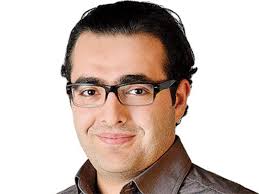Media and Journalism

Mahir Zeynalov
Journalist, Columnist, Editor-in-Chief, The Globe Post | USA
Short Bio:
Mahir Zeynalov has a diverse range of work experience in media and digital marketing. Mahir started their career as a Correspondent at the Los Angeles Times in September 2004 and held this role until December 2006. In September 2008, they joined Today’s Zaman as a News Editor and continued in this position until February 2016. In July 2016, they became the CEO of The Globe Post. In December 2017, they transitioned to the role of Executive Manager at The Defense Post. In April 2018, they founded their own company, MZ Digital Marketing. Throughout their career, Zeynalov has gained significant experience in media and journalism, as well as leadership and management roles in the digital marketing industry. Mahir Zeynalov’s education history includes attending Harvard University. However, the specific start and end year, as well as their degree and field of study, were not provided.
Event: SDGs Conference 2024 | Date: Sept 25, 2024 |
SPEECH
A few years ago, in Istanbul where I was doing journalism, I left home in the morning to go to my newsroom, and I kissed my wife goodbye because I had this thought that I may not be able to go back home again. That is exactly what happened. It was a very interesting and frustrating period in which I would get a lot of threats on social media. Some people were saying that they would just put a bullet into my head and imagine what kind of pressure it put on me and my family. As I arrived in my newsroom that day, I learned that there was an arrest warrant against me. I was already facing charges by, the then Prime Minister, now President of Turkey with up to six years in prison accused of assaulting him, also known as criticizing him. Imagine being a journalist in an autocratic country where the leader of the country is directly targeting you with his die-hard mobs where you face all this danger and risk just walking on the street. They stormed my house and later were on their way to our newsroom. A few people who knew us called our newspaper and said that the police were on their way to the newspaper. My editors helped me flee from the back door. I went into hiding in an isolated place for several days while the police were searching for me. The United States Government State Department facilitated my leave from Turkey, OSCE which raised international awareness.
Our newspapers struck a secret deal with the government that in exchange for my freedom, they would not arrest me, I would go and surrender to the police, and they would let me flee the country. That is how I ended up here. This situation is not an isolated incident compared to what happened a few years later when our newspaper was completely shut down and hundreds of journalists were thrown into jail. We then went through days in which they rolled out the tanks seizing the newspapers. That is not how you control information today. In polarized and divided societies, it is very easy to manipulate information.
People are seeking information that flatters their prejudices. Whenever you hear fake news or misinformation on the mainstream media or social media, you tilt your head and start questioning. When the information is coming from, even if it is fake or misinformation, somebody that you already trust, you think that it is possible that is how you feed the misinformation wave showing how dysfunctional our media environment is.
It is not feasible to jail journalists or influencers on social media because they are spreading misinformation; what you can do is to create an environment in the society where people do not rely on this inaccuracy. Whenever there is information pollution, people tend to ignore these threats. Therefore, we need trusted media institutions. The problem with the global media in the world is that because of these latest disruptions in social media and due to the abundance of information, news media organizations are in the blink of a bankruptcy. They are completely dysfunctional. A few years ago, the Washington Post was about to be bankrupt before Jeff Bezos took ownership. What Bezos did was he reduced the subscription key to a minimum, expanded the debase, and made it very attractive for corporations. News media organizations need to understand that they are run by journalists who do not know how to run a business.
That is the reason why they are losing money and attention. Media executives must accept that they are not in the news-selling business because information is free. Generating attention from corporations and selling that is how media organizations sustain their existence financially. We do not want any support or money from the government, international organizations or other foundations who would cut funding in any instance. What we want is a healthy business model for trustworthy news organizations. We need to empower such media entities and those journalists who are brave enough to speak the truth to the power. Journalists are talking to the people, not to the governments. Regardless of how powerful and autocratic the governments may be, they can never ignore what people are thinking about them. If the state is coming after you, that means you are doing something good.
